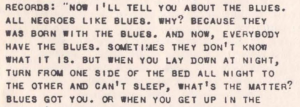As a relatively new country, America has had to define its own folk music rather forcefully, instead of allowing that definition to come about from hundreds and thousands of years of culture. Because of this, the line when it comes to what is considered folk music and what is not is relatively thin and grey. Folkways has been integral in this construction of a distinctly American folk music.
Folkways was founded in 1948 by Moses (Moe) Asch and Marian Distler. Though the label also distributed “world music,” it was and is known best for its part in the 1950s American folk music revival. It wasn’t until the late 1980s, when the Smithsonian Institution acquired the label, that Folkways branched out into other genres. Now, Folkways releases music from virtually every genre, with a Hip Hop anthology being released in 2020 (had to do my due intern diligence and plug it here).
So, why is this important? American folk music can be categorized and defined two different ways: as a genre and as a descriptor. Historically, American folk music as a genre has been very exclusive – meaning it has been dominated by white men of lower-middle and middle class backgrounds, and usually from rural/small-town America. As a descriptor, however, folk music has a much broader connotation. It is because of this that the Folkways of today looks little like the Folkways of 70 years ago. Blues, Jazz, and Hip Hop have all been recognized by Folkways as genres that fall within the definition of American folk as a descriptor.
Volume 2 of Folkways Jazz Anthology (released in 1950, so one of the early signs of Folkways being a leading force in this new definition of folk music) is called The Blues. Both the foreword and the editor’s notes discuss the definition of the blues in a similar way to how I have discussed the definition of folk. The Blues is folk, it is defined by certain syncopations, an aural tradition, specific instruments, chords, and inflections, etc. My question is, there are so many characteristics specific to blues as a genre, but does that mean that tunes that have some of these characteristics and not others are not blues?
The blues are also defined in the liner notes as stemming from slavery and African/ African-American traditions. The content of the blues is often related to “protest, recrimination, and ridicule.” Because of the shifting and exclusive nature of these definitions, it is difficult to choose what to subscribe to. My personal favorite comes from Lead Belly, who defines the blues as a state of mind, saying, “Now I’ll tell you about the blues. All negros like blues. Why? Because they was born with the blues. And now, everybody have the blues. Sometimes they don’t know what it is. But when you lay down at night, turn from one side of the bed all night to the other and can’t sleep, what’s the matter? Blues got you.”



